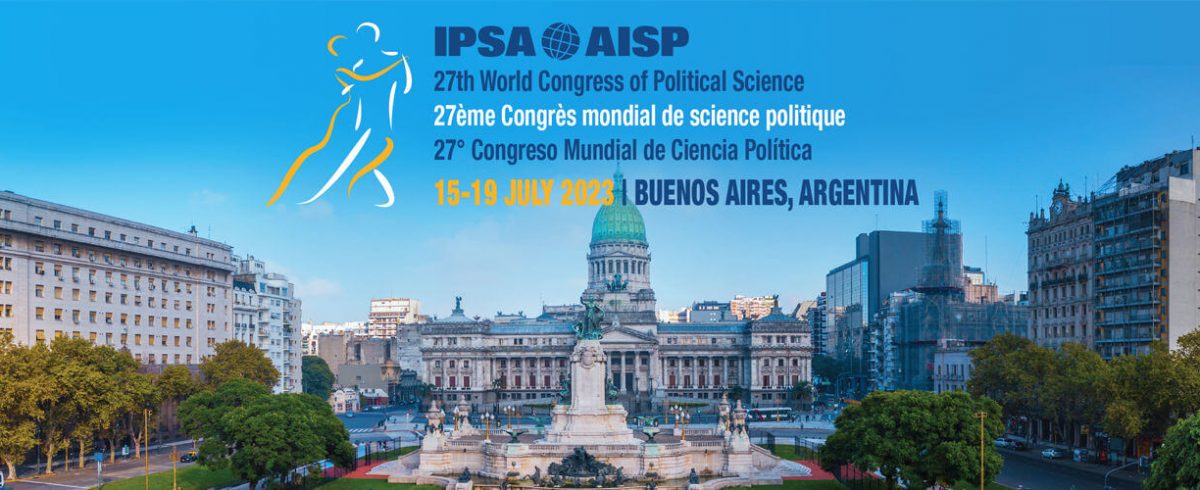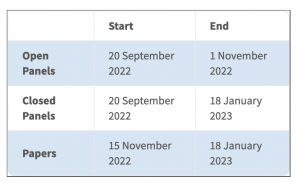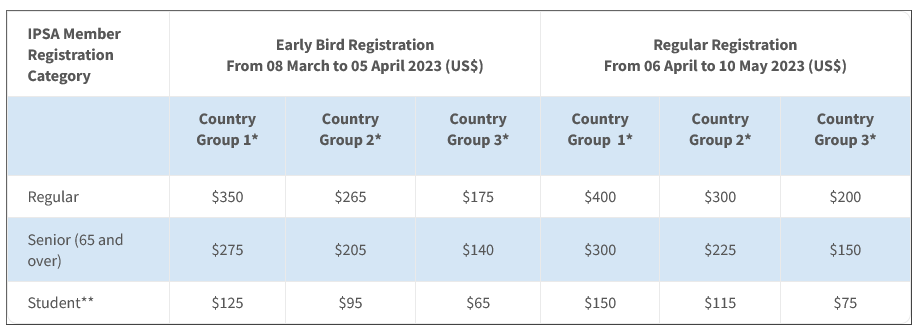le portail de la science politique française
le portail de la science politique française

Le 27e Congrès mondial de science politique de l’IPSA se tiendra à Buenos Aires, en Argentine, du 15 au 19 juillet 2023. Retrouvez sur le site web du congrès tous les détails sur le thème et le programme du congrès mondial, les dates limites importantes, les frais d’inscription, les informations sur les lieux, la procédure de demande de visa pour l’Argentine et des informations utiles sur Buenos Aires. L’AFSP encourage les politistes français à participer nombreux.ses à ce rendez-vous mondial de la science politique !
Toutes les infos ici : https://wc2023.ipsa.org/wc/home
NEW L’appel à contributions pour plus de 300 panels ouverts est accessible jusqu’au 18 janvier 2023 !
Toutes les infos…
FOCUS #Thème
Le 27e Congrès mondial de science politique de l’IPSA aura pour thème « La politique à l’ère des crises transfrontalières : vulnérabilité et résilience ».
« Domestic and international politics are notably challenged by complex transboundary problems that include climate change, cyber terrorism, global migration flows, financial instability and the COVID-19 pandemic, among others. These problems are transboundary in the sense that they traverse state boundaries in an era of intense global connectivity. Disruptions in one part of the world quickly move around the globe through highly integrated global networks.
Transboundary issues expose the grave consequences of the tragedy of the commons as coordinated global responses are frequently inadequate and sometimes absent. Global collective action so urgently required to comprehensively manage transboundary issues is found wanting. States are challenged to manage effects on citizens and political institutions, often muddling through with vulnerabilities evident across the layers of political life.
But citizens, states and the global system are also resilient. The international order was briefly interrupted by the freezing of politics during the COVID-19 pandemic. States sought to respond to the immediate challenges of the pandemic, yet as the early waves passed through, global politics resumed along pre-pandemic fault lines. State capacity is a crucial focus in terms of collaborative approaches among both state and non-state actors to address the so-called ‘wicked’ problems in the age of transboundary crises. Many governments experience ‘rally around the flag’ effects with sharp increases in support following the political shocks of a transboundary problem (financial crisis, political violence, natural disaster, etc.) but these effects are temporary with normal politics through citizens, social movements, political parties and leaders inevitably reasserting itself. Transboundary dynamics also create opportunities. The diffusion of debates and action on human rights and specifically on matters relating to gender equality, anti-racism and LGBT rights have benefited from global coalitions of citizens and civil society organizations.
In order to investigate, understand and contribute to academic and public debates on these complex transboundary problems and opportunities, the discipline of political science needs conceptual lenses and theoretical approaches that span traditional disciplinary boundaries and cross over social, cultural, economic, religious, ethnic, sexual and linguistic delineations. Connecting theory and praxis is also important. Transboundary approaches are called for and these might include but are not limited to interdisciplinarity, sub-field pluralism and diversity of methodological approaches. We invite proposals for panels and roundtables on topics relevant to the theme using both domestic and international analytical lenses and focusing on multiple units of analysis that include citizens, social movements, political parties, leaders, public policies, states and IOs. We especially encourage international participation and collaboration by scholars across boundaries. »
FOCUS #Agenda

FOCUS #Organisation
Ce congrès aura un nombre limité de panels uniquement virtuels afin de poursuivre son objectif : soutenir le développement de la science politique dans toutes les parties du monde et créer une communauté de science politique inclusive et mondiale. Le comité d’organisation local de 2023 a été conçu dans cet esprit comme l’un des plus inclusifs qui soient avec la participation de représentants d’associations régionales avec Daniel Buquet, secrétaire général de l’Association des études latino-américaines (ALACIP), Jesús Tovar Mendoza, président de l’Association mexicaine de science politique, Juan Carlos Gómez, président de l’Association colombienne de science politique et Luciana Veiga, présidente de l’Association brésilienne de science politique.
FOCUS #Inscriptions
Pour la première fois dans l’histoire de l’IPSA, les frais d’inscription au Congrès mondial seront basés sur le pays d’origine des délégués. Il s’agit de prendre en compte la disparité financière entre les pays pour permettre au maximum de politistes d’assister au Congrès mondial 2023. Tous les pays sont classés en fonction de leur revenu national brut. Le pays sélectionné doit être le pays de citoyenneté du membre. Cliquez ici pour voir la liste détaillée des pays.

